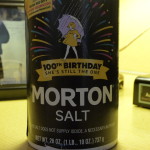“God hides, and is found, precisely in the depths of everything….”
Richard Rohr
In the second half of life, we leave behind the self we made, for the Self God made, the original self. We move out of the shallows and into the depths. We leave the old familiars and embrace a mystery that is not of the mind but of the heart; that is not abstract, but Real and present in us. And then we are asked to live it into our lives. I get reminded of such things in the strangest of ways.
I went to the store for Mom yesterday before church. She had a modest list. Twenty-two dollars worth of cheese, bananas, lettuce, TV dinners. I bought salt. I bought more than salt, but this was Morton’s blue canister with the girl with the umbrella and yellow dress on it. We haven’t had Morton’s salt in the house for a while and I missed it. The girl, the yellow banner tells me, is 100 years old this year.
 This morning, as I walked past the kitchen counter where I left the salt last night, I started thinking of how emblems, logos, and packaging were the pre-reading way we joined the grown-up world. When I was a very little girl, Mom could say, “Margaret, go get the salt for me,” and I would know where to look and how to find. It’s a kind of familiarity that is craved. Pretty soon it grows into the desire to know what others know; to feel part of things. It extends to friends. I was of the first Barbie doll generation, and Barbie quickly grew family members and friends. Although I never had a Midge or a Ken doll, to not know who they were would have been an embarrassing lapse. I see it now in my grandson for whom there is so much more to keep up, and who finds it exceedingly pleasurable to be familiar with what his friends are familiar. To “not know” is to be out of the loop.
This morning, as I walked past the kitchen counter where I left the salt last night, I started thinking of how emblems, logos, and packaging were the pre-reading way we joined the grown-up world. When I was a very little girl, Mom could say, “Margaret, go get the salt for me,” and I would know where to look and how to find. It’s a kind of familiarity that is craved. Pretty soon it grows into the desire to know what others know; to feel part of things. It extends to friends. I was of the first Barbie doll generation, and Barbie quickly grew family members and friends. Although I never had a Midge or a Ken doll, to not know who they were would have been an embarrassing lapse. I see it now in my grandson for whom there is so much more to keep up, and who finds it exceedingly pleasurable to be familiar with what his friends are familiar. To “not know” is to be out of the loop.
In the same way, many of us became familiar, quite young, with all kind of ideas to which I give the designation, like Morton’s salt, of “old familiars.”
Richard Rohr’s book, Falling Upward holds a reference to that old familiar, “sin.” He says, “Sin is to stay on the surface of even holy things….” Recently having completed the audio recording of ACOL’s Chapter 8, I was reminded of how Jesus speaks of the way our thoughts and emotions mask “the language of the heart.” They “bury stillness,” he says, “deep beneath an ever-changing milieu of life lived on the surface.” (8.7) That surface level is where all of our old familiars abide.
“Sin is to stay on the surface of even holy things….” Recently having completed the audio recording of ACOL’s Chapter 8, I was reminded of how Jesus speaks of the way our thoughts and emotions mask “the language of the heart.” They “bury stillness,” he says, “deep beneath an ever-changing milieu of life lived on the surface.” (8.7) That surface level is where all of our old familiars abide.
Rohr has written one of those books that, for me, complements and helps me to deepen my understanding of A Course of Love. Falling Upward is a book in which I find common reference to the uncommon journey, the “further journey” as he calls it…away from the “old familiars.”
His book is pretty well dedicated to an idea of a second half of life. And that’s the way I see A Course of Love too. There is the first half of life, a life of ego building and achievement, of valuing the mind above all else, of seeking and following. And then there is the second half…. Rohr admits to having found that “many if not most people and institutions remain stymied in the preoccupations of the first half of life.”
 So I’ll back up and complete the little gem I shared at the top of this post and that Rohr shared just before his description of sin. “God hides, and is found, precisely in the depths of everything, even and maybe especially in the deep fathoming of our fallings and failures.” If you go to the depths of anything, he says, you begin to “knock upon something substantial, “real,” and with a timeless quality to it.” You begin to move from belief to knowing, deep inner knowing, which is the movement we are called to in A Course of Love. Rohr says that we are “summoned” to this further journey. In ACOL, Jesus calls us to the heart by way of homesickness and desire for our true selves, feelings that we can follow to our own inner depth.
So I’ll back up and complete the little gem I shared at the top of this post and that Rohr shared just before his description of sin. “God hides, and is found, precisely in the depths of everything, even and maybe especially in the deep fathoming of our fallings and failures.” If you go to the depths of anything, he says, you begin to “knock upon something substantial, “real,” and with a timeless quality to it.” You begin to move from belief to knowing, deep inner knowing, which is the movement we are called to in A Course of Love. Rohr says that we are “summoned” to this further journey. In ACOL, Jesus calls us to the heart by way of homesickness and desire for our true selves, feelings that we can follow to our own inner depth.


